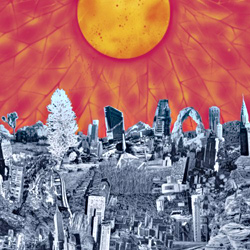Parts & Labor
Mapmaker
(Brah/Jagjaguwar)
It’s fitting that Brooklyn’s Parts & Labor have found a home on Oneida’s imprint, Brah Records, as the two bands share more than just a little in common. Parts & Labor’s music, utilizing frenzied, superhuman drumming, thrashing keyboards, and a general sense of screeching experimentalism, recalls the oeuvre of that other Brooklyn trio—check out the fevered percussion of the opening track, “Fractured Skies,” for proof. But overall, Mapmaker veers off into territory unfamiliar to their label suits, as “pop-influenced song structure infects P&L’s noise-rock. While not Clear Channel-ready by any means, songs like the anthemic, punk-tinged “Brighter Days” and “The Gold We’re Digging” find the band mining the hard-rocking core of their emotions. Multi-instrumentalists Dan Friel and BJ Warshaw trade off unwavering vocals over the course of this percussive, commanding album, which pleasantly pummels the listener from start to finish. By the time their version of the Minutemen’s “King of the Hill” rolls around, it seems evident that while Oneida-isms abound, Parts & Labor’s path is truly their own. JONAH FLICKER
Listen to a sample of Parts & Labor’s “A Great Divide.”
var so = new SWFObject(“http://media.seattleweekly.com/players/vvmMiniPlayer.swf?audioFile=http://media.newtimes.com/id/815466/&autoPlay=no”, “theSWF”, “91”, “32”, “8”, “#FFFFFF” ); so.write( “player” );
Parts & Labor play Chop Suey, 1325 E. Madison St., 324-8000, www.chopsuey.com. $10. 9 p.m. Sat., April 28.
Frog Eyes
Tears of the Valedictorian
(Absolutely Kosher)
The crackling dirges and noise of Casey Mercer’s Victoria, B.C.–based outfit, Frog Eyes, have earned it more than a few Animal Collective and Xiu Xiu comparisons. Considering the lineup includes Spencer Krug, comparisons to Wolf Parade and Sunset Rubdown are also in order. Though Mercer’s yelping vocals and Latinate-quality literary allusions were always madly inspired, those of us who enjoy melody along with our noise will find Mercer’s fourth full-length, Tears of the Valedictorian, easily his best to date. “Idle Songs,” the opener, is anything but idle, immediately injecting an incessant, beat-keeping piano with his off-kilter, warbly voice and distorted guitar. Songs like “Stockades”—or “Bushels,” the nine-minute centerpiece—demonstrate his ability to craft sweeping, epic ballads and glitchy glam-rock; think an angry Arcade Fire doing Bowie or Queen, or vice versa. It sounds like the fragile, maniacal beauty of previous Frog Eyes, but with such tight song–writing, Mercer sounds like he’s less in aimless pain and more inspired and frenzied to find the dense and gorgeous sound to suitably scare and hypnotize us all. KARLA STARR
Listen to a sample of Frog Eyes’ “Idle Songs.”
var so = new SWFObject(“http://media.seattleweekly.com/players/vvmMiniPlayer.swf?audioFile=http://media.newtimes.com/id/815465/&autoPlay=no”, “theSWF”, “91”, “32”, “8”, “#FFFFFF” ); so.write( “player” );
Frog Eyes play the Crocodile Cafe, 2200 Second Ave., 441-5611, www.thecrocodile.com. $10 adv./$12. 9 p.m. Tues., May 1.
Lou Reed
Hudson River Wind Meditations
(Sounds True)
Last year, I spent three days in silence along the Duwamish River. When you don’t talk for that long, you naturally begin to listen deeply. Then you hit a state where you feel guilty for being too busy and caught up with your own head to really hear everything and everyone around you. By the end you settle, and tension is lifted, and you are forever transformed. Lou Reed’s Hudson River Wind Meditations is built for quiet contemplation. For more than an hour, Reed, a longtime practitioner of tai chi and meditation, creates smooth and soothing sine waves that recall the gentle lolling of the fabled New York waterway. There are sounds on here that also recall the expanding harmony and ringing of Tibetan meditation bowls. The hipsters will probably laugh it off as a sign of Reed’s old age, but this record has everything in common with LaMonte Young’s Theatre of Eternal Music, which was a major influence on the Velvet Underground. Instead of the confrontational repetition the Velvets were renowned for, however, this is an inviting sort of repetition. It invites you to explore your own soul, which, as Jung noted, is often the most confrontational experience. What’s most striking is that, while the album is considered a meditation on a body of water, deeper listens reveal creaks and groans which echo the inner workings of N.Y.C. Perhaps if the people of New York would shut up for once, this is what their home would sound like. BRIAN J. BARR




